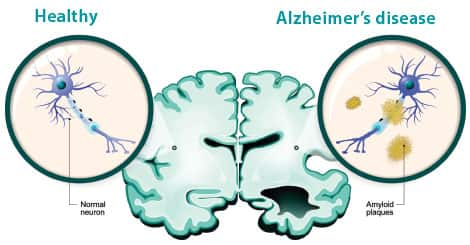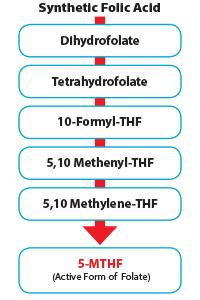Role of Folate in Healthy Human Brain Function

B vitamins are critical for the production of neurotransmitters in the brain.
Insufficiency is associated with cognitive decline.1-3
Folate has a number of mechanisms by which it can enhance cognitive performance. These include lowering inflammation and reducing homocysteine.1,4
Elevated homocysteine and chronic inflammation are linked to degenerative brain disorders.
Perhaps the most far-reaching implication of folate in the brain is its ability to modify gene expression.1
This means that folate plays a role in turning a gene “on” or “off.”
Without enough folate, genes involved in the production of beta-amyloid are “turned on.”5,6
Studies show that adding folate to brain cell cultures can silence—or “turn off”— genes that produce toxic beta-amyloid proteins.1,7
The takeaway from these studies is that folic acid performs a host of functions that support youthful brain cell structure and function.
What You Need to Know
 |
Folate Slows Brain Aging
- Mild cognitive impairment is an early indicator of dementia.
- Up to 15% of people over 65 years old with mild cognitive impairment will proceed each year to develop dementia, compared with less than 2% of those without mild cognitive impairment.16
- Studies show that mitigating mild cognitive impairment can ward off dementia, preserving more youthful cognition.
- A groundbreaking human clinical trial has found that supplementation with folic acid successfully improved cognitive function in adults with mild cognitive impairment.
- Deeper findings of the study show that folic acid reduces production of dangerous Alzheimer’s-associated proteins, while also lowering toxic homocysteine levels.
Folate’s Anti-Dementia Properties
The primary sources of folate (vitamin B9) include vegetables like broccoli, asparagus, spinach and Brussels sprouts. Cooking vegetables causes folate loss,8 which means we consume less of this nutrient than we might think.
One research group has been studying folate supplementation in older adults for half a decade. Their research has demonstrated folate’s beneficial effect on cognitive function.1,4,9
In their latest study, they explored the cognitive effect of supplementing with folate for an average of two years.1
The study included 180 subjects with mild cognitive impairment.1 Half received folic acid (400 mcg/day), while the other half received standard care (guidance on nutrition and activity aimed at enhancing memory late in life).
After 24 months, the people in the folate group experienced three encouraging results:
1. Improvements in cognitive testing
By the end of the study, the folate group demonstrated significant increases in cognitive test scores, including full-scale IQ (which indicates a person’s average intelligence), verbal IQ, and measures of memory.
Combined treatment scores for the six verbal IQ tests were also significantly higher in the folate group, as was the combined treatment score for all 11 tests (full-scale IQ).1
2. Improvements in markers of DNA methylation
Folate supplementation was shown to beneficially affect genes involved in DNA methylation,1 thereby assisting the body to metabolize homocysteine.
In the supplemented group, two important blood markers were increased:
- Folate levels
- S-adenosylmethionine levels (SAMe, a natural compound that helps in the production of several key neurotransmitters and alleviates depression)
At the same time, two blood markers associated with poor cognitive outcomes were reduced:
- Homocysteine, a harmful amino acid that can lead to stroke, coronary disease, and dementia
- S-adenosyl homocysteine (SAH) levels, the precursor for homocysteine
The important ratio of SAMe/SAH was also increased, indicating a return to a healthy methylation.1
3. Reduced levels of brain-toxic proteins
Toxic beta-amyloid plaques are a hallmark of Alzheimer’s disease. These distorted proteins accumulate in the brain, where they damage brain cells and interrupt the communication between neurons. The result is loss of memory and brain function.
Folate can help prevent beta-amyloid plaques from forming.
This study showed that subjects in the folate group had significantly lower blood levels of molecules involved in forming these brain-damaging plaques.1 Blood levels of these plaque-forming molecules reflect their accumulation in the brain. The presence of plaque-forming molecules may predict early Alzheimer’s disease or cognitive decline.1,10-12
Overall, this study showed that folic acid supplementation significantly improved cognitive performance as seen by the increases in cognitive test scores. In addition, folic acid also reduced the abundance of beta-amyloid that directly damages brain cells.1
What’s interesting about this study is the low-dose of folate used. Many older people are deficient in folic acid and other B vitamins and essential nutrients, meaning their levels of the bioactive form of folate, called 5-MTHF (5-methyltetrahydrofolate), are also perilously low.
People with elevated homocysteine often take 1,000 mcg to 10,000 mcg of 5-MTHF daily along with vitamins B12, B6 and B2. A number of previous studies have shown better results using 5-MTHF than standard folic acid.13-15

5-MTHF: The Best Form of Folate Supplementation
 |
In the body, the folate molecule goes through several enzymatic steps to become the active molecule 5-MTHF.17-19
In order to make the conversion from folate to the active 5-MTHF, an enzyme called methylenetetrahydrofolate reductase or MTHFR is necessary—and not everyone has sufficient activity of the gene that codes for this enzyme. It is estimated that between 5% and 10% of the population has a gene variant that reduces MTHFR activity by 70%,20 while nearly 50% of people of European descent have a genetic variation that decreases MTHFR activity by as much as 35%.18,19,21-24
Supplementation with 5-MTHF bypasses the enzyme defect and provides the body with exactly the right molecule it needs.
Summary
This new study has demonstrated that even low-dose folic acid supplementation produces changes in gene function and in biochemistry that benefit the aging brain.
The favorable change in gene expression results in reduced production of toxic (beta-amyloid) proteins implicated in dementia.
Additionally, folate lowers the high homocysteine levels that often accompany brain aging and dementia. As a result, folic acid supplementation helps preserve cognitive function in adults with mild cognitive impairment.
Slowing the progress of mild cognitive impairment could delay the onset of dementia like Alzheimer’s and Parkinson’s diseases.
There is no reason for people to be deficient in folic acid as it is a remarkable low-cost nutrient.


Social Login